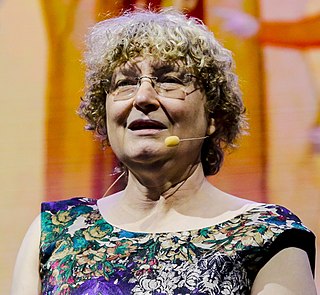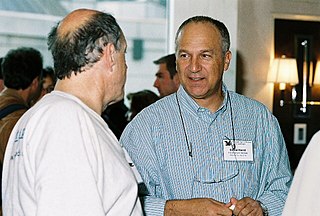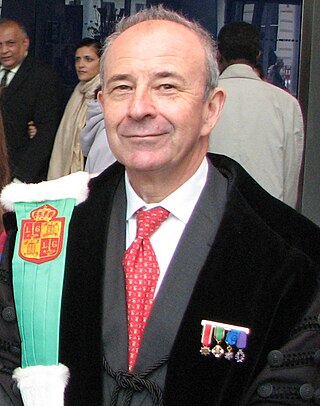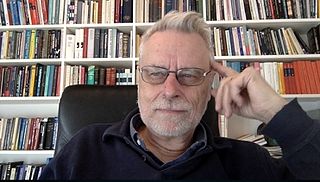Related Research Articles

Grigory Isaakovich Barenblatt was a Russian mathematician.

Madhu Sudan is an Indian-American computer scientist. He has been a Gordon McKay Professor of Computer Science at the Harvard John A. Paulson School of Engineering and Applied Sciences since 2015.

Paul Ching Wu Chu is a Chinese-American physicist specializing in superconductivity, magnetism, and dielectrics. He is a professor of physics and T.L.L. Temple Chair of Science in the Physics Department at the University of Houston College of Natural Sciences and Mathematics. He was the president of the Hong Kong University of Science and Technology from 2001 to 2009. In 1987, he was one of the first scientists to demonstrate high-temperature superconductivity.

Baroness Ingrid Daubechies is a Belgian-American physicist and mathematician. She is best known for her work with wavelets in image compression.

Éva Tardos is a Hungarian mathematician and the Jacob Gould Schurman Professor of Computer Science at Cornell University.

David Harel is a computer scientist, currently serving as President of the Israel Academy of Sciences and Humanities. He has been on the faculty of the Weizmann Institute of Science in Israel since 1980, and holds the William Sussman Professorial Chair of Mathematics. Born in London, England, he was Dean of the Faculty of Mathematics and Computer Science at the institute for seven years.

Sami Erol Gelenbe, a Turkish and French computer scientist, electronic engineer and applied mathematician, pioneered the field of Computer System and Network Performance. Currently Professor in the Institute of Theoretical and Applied Informatics of the Polish Academy of Sciences, he is also an Associate Researcher in the I3S Laboratory and Abraham de Moivre Laboratory. Fellow of several National Academies, he Chairs the Informatics Section of Academia Europaea since 2023. His previous Professorial Chairs include the University of Liège (1974-1979), University Paris-Saclay (1979-1986), University Paris Descartes (1986-2005), NJIT (1991–93), ECE Chair at Duke University (1993-1998), University Chair Professor and Director of EECS, University of Central Florida (1998-2003), and Dennis Gabor Professor and Head of Intelligent Systems and Networks, Imperial College (2003-2019).

Moshe Ya'akov Vardi is an Israeli mathematician and computer scientist. He is the Karen Ostrum George Distinguished Service Professor in Computational Engineering at Rice University, United States. and a faculty advisor for the Ken Kennedy Institute. His interests focus on applications of logic to computer science, including database theory, finite model theory, knowledge of multi-agent systems, computer-aided verification and reasoning, and teaching logic across the curriculum. He is an expert in model checking, constraint satisfaction and database theory, common knowledge (logic), and theoretical computer science.

Brian David Outram Anderson is Professor in the Research School of Information Sciences and Engineering at the Australian National University. His research interests include circuits, signal processing and control, and his current work focuses on distributed control of multi-agent systems, sensor network localization, adaptive and non-linear control. Professor Anderson served as President of the Australian Academy of Science from 1998 to 2002.

James Weldon Demmel Jr. is an American mathematician and computer scientist, the Dr. Richard Carl Dehmel Distinguished Professor of Mathematics and Computer Science at the University of California, Berkeley.
Lydia E. Kavraki is a Greek-American computer scientist, the Noah Harding Professor of Computer Science, a professor of bioengineering, electrical and computer engineering, and mechanical engineering at Rice University. She is also the director of the Ken Kennedy Institute at Rice University. She is known for her work on robotics/AI and bioinformatics/computational biology and in particular for the probabilistic roadmap method for robot motion planning and biomolecular configuration analysis.

Anders Gunnar Lindquist is a Swedish applied mathematician and control theorist. He has made contributions to the theory of partial realization, stochastic modeling, estimation and control, and moment problems in systems and control. In particular, he is known for the discovery of the fast filtering algorithms for (discrete-time) Kalman filtering in the early 1970s, and his seminal work on the separation principle of stochastic optimal control and, in collaborations with Giorgio Picci, the Geometric Theory for Stochastic Realization. Together with late Christopher I. Byrnes and Tryphon T. Georgiou, he is one of the founder of the so-called Byrnes-Georgiou-Lindquist school. They pioneered a new moment-based approach for the solution of control and estimation problems with complexity constraints.
Amie Wilkinson is an American mathematician and Professor of Mathematics at the University of Chicago. Her research topics include smooth dynamical systems, ergodic theory, chaos theory, and semisimple Lie groups. Wilkinson, in collaboration with Christian Bonatti and Sylvain Crovisier, partially resolved the twelfth problem on Stephen Smale's list of mathematical problems for the 21st Century.
Mei Hong is a Chinese computer scientist, a professor at Peking University, the director of Key Laboratory of High Confidence Software Technologies of Ministry of Education (MOE) at Peking University. He serves as President of the China Computer Federation (2020-2024), formerly the Vice President of The Academy of Military Sciences, Beijing Institute of Technology, and Shanghai Jiao Tong University. He is an academician of the Chinese Academy of Sciences, a foreign member of the Academia Europaea, a fellow of The World Academy of Sciences, an IEEE Fellow, and an ACM Fellow.

Janusz Kacprzyk is a Polish engineer and mathematician, notable for his contributions to the field of computational and artificial intelligence tools like fuzzy sets, mathematical optimization, decision making under uncertainty, computational intelligence, intuitionistic fuzzy sets, data analysis and data mining, with applications in databases, ICT, mobile robotics and others.
Paola Inverardi is an Italian computer scientist specializing in software engineering. She is a professor in the Department of Information Engineering, Computer Science, and Mathematics at the University of L'Aquila in Italy, and the former rector of the university.
Abdel-Shafy Fahmy ObadaFAAS is an Egyptian professor of mathematics at the Department of Mathematics, Faculty of Science, Al-Azhar University. He is an elected member and the former Vice president of African Academy of Sciences. A fellow of the British Institute of Physics, a founding member and the first president of the Egyptian Mathematical Society.

Obada Prize is an international award supported by the Natural Sciences Publishing and African Academy of Sciences. It was established to recognise the excellence of Egyptian Mathematics Emeritus Professor, Obada Abdel Shafy. The award aims to identify creative interdisciplinary research that cuts across traditional boundaries. It also aims at encouraging values and excellence that can promote the humanistic scientific and technological breakthrough that can improve our world.
Sohail Nadeem is a Pakistani Professor of Applied Mathematics and Chairman of Mathematics Department at Quaid-i-Azam University. He is Young a Fellow of the world Academy of sciences and an elected Fellow of Pakistan Academy of Sciences. He is a recipient of the 2022 Obada Prize Award.

Mohamed-Slim Alouini is the Al-Khwarizmi Distinguished Professor of Electrical and Computer Engineering and the holder of the UNESCO Chair in Education to Connect the Unconnected at the King Abdullah University of Science and Technology (KAUST), Thuwal, Makkah Province, Saudi Arabia. His research interests include the modeling, design, and performance analysis of wireless, satellite, and optical communication systems. He is a fellow of the Institute of Electrical and Electronics Engineers (IEEE) and OPTICA (formerly known as the Optical Society of America.
References
- ↑ "Jinde Cao". Southeast University. Retrieved 2019-12-29.
- ↑ "Professor Jinde Cao was Elected as Foreign Fellow of Pakistan Academy of Sciences". Southeast University. 2017-12-24. Retrieved 2019-12-29.
- ↑ "Prof. Jinde Cao was elected as IEEE Fellow". Southeast University. 2016-10-09. Retrieved 2019-12-29.
- ↑ "Jinde Cao". Academia Europaea. Retrieved 2019-12-29.
- ↑ "Professor Jinde Cao was Elected as Member of the European Academy of Sciences and Arts". Southeast University. 2018-03-13. Retrieved 2019-12-29.
- ↑ "Professor Jinde Cao was awarded the 2019 Obada Prize". 2019-02-21. Retrieved 2019-12-29.